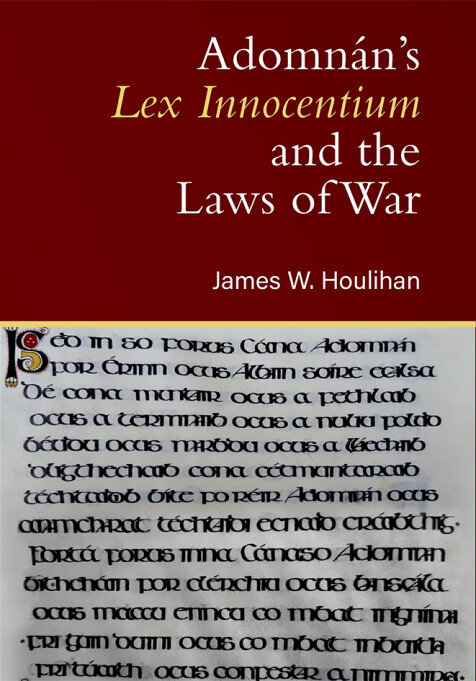Adomnán's Lex Innocentium and the Laws of War
James W. Houlihan
“The modern rules governing the conduct of war and the protections for non-combatants came into being during the course of the twentieth century. The concepts that lay behind such rules have a long history. This study concerns the Lex Innocentium, ‘law of the innocents’, formulated by Adomnán (ninth abbot of Iona who died in 704), which was promulgated in Ireland at Birr, Co. Offaly in 697. Dr Houlihan’s purpose ‘is to place or situate LxI in the history of warfare and, more particularly, in the history of attitudes to non-combatant involvement in warfare and the laws giving expression to those attitudes …’. Modern laws make a clear distinction between combatants and non-combatants. Non-combatants should be protected, as the International Court of Justice makes clear. As Dr Houlihan states ‘This is a striking parallel to what Adomnán did in his law in 697’. It is this parallelism that makes his study of Adomnán’s law so important ... as so many recent studies have shown (and as Dr Houlihan demonstrates in an exemplary fashion) Adomnán was one of the leading European intellectual figures of his day. This is a remarkable study for the clarity of its arguments and the quality of its language. Dr Houlihans’s judgement on a variety of matters shows his deep understanding of and empathy with early Irish and early European societies.” Charles Doherty, Cambrian Medieval Celtic Studies, January 2022.
“If you should happen to be an aficionado of gripping true-life, historical, Irish-focused action-adventure stories, then Lex Innocentium (Lex I) is a book you will want to read, not just once, but over and over again. Such is the treasure trove of unexpected, and electrifying, discoveries within its 200 or so riveting pages …It is a masterpiece in tale-telling … Lex Innocentium is a book apart. It is not the dry academic tome one might assume, of interest only to historians, students, and seekers of ancient laws ... The reader is led on a wild, spellbinding and sometimes terrifying ride from the Greek to Roman wars, the mass beheadings at Solomon’s Temple, and the murders of women, children and clerics. The author also covers the First and Second World Wars and the reprehensible atrocities committed by American soldiers during the Vietnam War ... Please don’t think that this is solely a story about killings, battles, slaughters, skirmishes, hostages and prisoners – though there are plenty of those, with vividly descriptive examples. Rather, it is the study of early Irish law, and of one determined and righteous man who lived long ago. Adomnán decided he wanted to make a difference in the Christian world. He did not challenge the right to go to war, just the rules by which battles were fought. Above all, the author strives to identify the rightful place of Adomnán’s law within the history of the laws of war and, in doing so, he reaches some surprising conclusions. This is an excellent, inspiring read for everyone, and a real page-turner.” John Morris, The Law Society Gazette, July 2021
"James W. Houlihan’s Adomnán’s Lex Innocentium and the Laws of War examines Adomnán’s Lex Innocentium with the purpose of situating the text “in the history of warfare, and, more particularly, in the history of attitudes to non-combatant involvement in warfare and the laws giving expression to those attitudes” (12). This work combines the author’s training as both a solicitor and an historian, and, thus, readers are given both a very practical, real-world perspective on the Lex Innocentium combined with rigorous attention to, and interpretation of, historical sources … The author should be congratulated on writing such a far-ranging and thought-provoking book. This task is made all the more difficult when the main edition of the text under discussion is still unpublished … Although scholars have always known that Adomnán’s Lex Innocentium was an important and unusual text, this study highlights just how ground-breaking the text actually was, especially when placed in the context of other contemporary medieval Western European legal traditions and philosophical ideas. No matter how well anyone knows this text, this book will provide fresh perspectives and a deeper understanding of the wider historical, philosophical, and political context for the creation of Adomnán’s Lex Innocentium." Charlene M. Eska, PERITIA (vol. 32, end of 2021)
“[A] welcome addition to the corpus of research on the cáin-law as promulgated by Adomnán in 697 ... Aside from Máirìn Nì Dhonnchadha’s unpublished Ph.D dissertation (UCC, 1991), a truly comprehensive study of Lex Innocentium has not been completed in recent years. This volume is immensely valuable in that regard, if not simply for its well-rounded analysis and presentation of the text as it may have been situated during the time of its initial composition. Courtney Selvage, North American Journal of Celtic Studies (Vol. 5. Issue. 1. Spring 2021)
“James Houlihan’s exciting book was published in 2020. It is a very important addition to our understanding of Adomnán, who is probably better known in Donegal as Adhamhnán (in Irish) or Eunan (in English). Under those modern forms of his name, he is the patron of several institutions in the county: schools and GAA clubs, for instance, among them. He is also, of course, the patron of both the Church of Ireland and Roman Catholic dioceses of Raphoe … Adomnán is possibly best known today as the author of a major book in Latin about his predecessor, relative and ‘hero’, Colum Cille – the Vita Columbae … The other text of which his authorship is completely certain is known variously as the Lex Innocentium, ‘Law of the Innocents’, or as Cáin Adomnáin, ‘Adomnán’s Law’. It is written in Irish and was designed to protect non-combatants in a society where various forms of violence and warfare were endemic - just as they were all over Europe at the time ... This new book by James Houlihan,, is a major milestone in terms of the scholarship relating to Donegal’s medieval heritage. It sets out not only the local and national importance of Adomnan’s ‘Law of the Innocents’ but places it, for the first time, in its true international significance.” Brian Lacey, DONEGAL ANNUAL. No 73 2021
"In this book the ordinary reader will find an account of the roots of the views about the treatments of innocent civilians, clergy and other unarmed folk in time of war. It is a discussion of the Cáin Adomnáin ... but lawyer turned historian James W. Houlihan ranges well outside the confines of early Christian Ireland to discuss ideas about laws of war and the protection of non-combatants over the centuries ... Here in Adomnán is perhaps the basic source and moral justification of Ireland's long-sustained neutrality, and the country's well-established services in the cause of peace and development. Readers should not feel themselves daunted by the academic appearance of this book, for it is quite readable; the work of a new historian long used to handling and presenting legal evidence with clarity, and is filled with aperçus that will give everyone who reads the book 'furiously to think'." Peter Costello, The Irish Catholic, (August, 2020).


